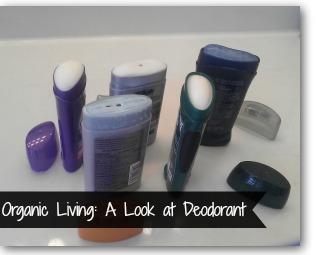This post may contain affiliate links. Read our disclosure here.
 The following is part of an Organic Living Journey Guest Post Series now written by Mariana who has a mother’s heart and scientist’s brain.
The following is part of an Organic Living Journey Guest Post Series now written by Mariana who has a mother’s heart and scientist’s brain.
Powder fresh, lavender fields, shower fresh, baby powder soft, orchard blossom, soothing chamomile, spring rain…
Today, we’re talking about deodorants, one of the most commonly used toiletries next to soap and toothpaste. We’re going to look at the science behind body odor, the different kinds of natural deodorants available, and some of the health concerns people are voicing about our deodorants.
So, what causes body odor?
In one word: bacteria.
You have sweat glands all over your body and most of them will secrete liquid (water and salt) to help your body cool down when it gets too warm. However, the sweat glands in “hairy regions” (scalp, underarms, etc.) are different. They have a special type of sweat on reserve, a “fatty” sweat loaded with proteins and pheromones. When this stuff is secreted, the bacteria on your skin (which are evidently just hanging out, waiting for something exciting to happen) begin breaking down the sweat protein-rich sweat, releasing odor as a byproduct. Sweat + Bacteria = Odor
Simple, right? Not so much. If it was that simple, everyone would sweat the same and smell the same. Other factors can affect odor. For one thing, diet. What you put into your body changes what comes out of it. Some people are sensitive (not allergic) to different foods that, when eaten, can affect their personal body odor. Another factor? Your genes. A study earlier this year showed that body odor is linked to a gene. If you have a specific expression of the ABCC11 gene, you don’t smell. Yet, 80% of these non-smelly people still used deodorant out of habit or social convention.
How do deodorants stop odor?
First, some basic terminology:
- Deodorant – a product that prevents or conceals odor
- Anti-perspirant – a product that prevents sweating
- Anti-perspirant & Deodorant – a product that prevents sweating and removes odors
Deodorants have been part of civilization since 3500 B.C. when the Sumerians first mentioned it in writing. Egyptians would used spices and citrus to mask odor. No doubt, we like a pleasant scent. Modern day deodorants work by killing the odor-causing bacteria. You will still sweat, but the bacteria will be gone, so you won’t smell.
Antiperspirants, on the other hand, have only been commonplace for the last 80 years or so. The active ingredient in antiperspirants (what the majority of people use) is some kind of aluminum ion (aluminum chloride, for example). The aluminum ions are drawn into the cells around your sweat gland, taking water with them. The water physically swells the cells, closing the sweat gland openings in the process. Over time, the water seeps back out, reopening the sweat glands. The FDA classifies antiperspirants as drugs, because they alter the natural function of the body.
The first anti-perspirant? Mum in 1888. However, antiperspirants didn’t catch on to mass public appeal until some “clever” marketing ads in the 1920’s, kindly deceiving informing women that men all gossip behind their backs about how bad they smell (see above). Lovely, huh? Ads didn’t target men until the 1950’s. Today, body odor is taboo and deodorants and antiperspirants are an $18 billion worldwide industry. [Photo credit- For more details about the history of this industry (and more vintage ads) check out the Smithsonian’s informational article.]
Are there health concerns?
If you Google “deodorant”, “can cause cancer” quickly pops up next to it. In 2003, a study showed that women who shaved their underarms regularly and used antiperspirants (not deodorants) developed breast cancer 22 years earlier than women who didn’t. A 2005 study added supporting clinical evidence, showing that breast cancer originated in the same place that these aluminum ions were applied, stating that aluminum (like the active ingredient in antiperspirant) is known to alter DNA and has epigenetic effects. (Have you read about epigenetics? Basically, it’s all about how stuff like environmental factors can physically change our DNA. Fascinating.) Another scientist points out that parabens (chemicals also found in deodorants and antiperspirants) are proving to be oestrogenic in lab tests (meaning they act like human estrogen). The big deal?
“Increased concentrations of circulating oestrogens have been found to be strongly associated with increased risk for breast cancer in postmenopausal women” [from a 2003 study].
In fact, there are dozens of chemicals in our antiperspirants that are oestrogenic (a detailed list can be found here). Notice something? All this research is very new, about 10 years old. Some research has also drawn a correlation between aluminums and Alzheimer’s disease. The link is not confirmed, but in my opinion, there’s enough to make me leery of using aluminums or parabens. More than anything, I hope research continues so we can get some definitive answers and work towards increased prevention of these diseases. [Want more details about current research and data? I’d point you towards this one research article that summarizes a lot of the concerns between underarm deodorant use and breast cancer.]
We could spend a lot of time discussing the woes of antiperspirants, but let’s focus on some good options to keep odor away and not use any aluminum or parabens in the process. And no…you don’t have to smell like Matthew McConaughey.
My Story
About one year ago, I decided to try some alternatives. Up until then, I used a normal antiperspirant & deodorant combo with good success. No odor, no excessive sweating. I switched to the only “natural deodorant” brand I found at my local Target, “Tom’s of Maine Long Lasting” deodorant. It boasted 24 hour odor protection on the label and had a nice, all natural lavender scent. I tried it the next day and…hated it. I felt damp and icky (but I didn’t smell). I put it back on my shelf and went back to my normal stuff.
A few months later, I was inspired to give it a second chance. I began alternating- one day Toms, one day normal. On the Tom’s days, I also added a body powder that I had on hand. After a week, I decided to go cold turkey and switched to Tom’s. Two weeks later, my body had normalized, and I no longer felt damp! In fact, I wasn’t sweating much at all. I’m not sure why, but I felt dry again. Anyone else have a similar (or different) experience?
What about exercising? Friends, I practice hot yoga. 105º F in 40% humidity for 60-90 minutes. I sweat. A lot. Since bacteria, not sweat, produce odor, you don’t smell when you sweat, only if it hangs around long enough to feed bacteria, which the deodorant kills off. No bacteria, no odor. I haven’t felt the need for an antiperspirant (just deodorant).
Shopping for Alternatives
Disclaimer: When you go shopping, you’ll see different options for “natural deodorants.” Remember to always check the labels, because the “natural” label can be deceiving, and sometimes it’s no more than deceptive marketing. Some deodorants also contain triclosan (an antibacterial bad guy), so keep an cautious eye out for those.
I’m taking a conservative approach and choosing to avoid any oestrogenic chemicals. To sum up, that’s: aluminums, triclosan, parabens, fragrances, and phthalates. What’s on your “avoid” list, if anything? Decide what’s on your personal list and start reading labels! Here are a few options you’ll probably find in the store:
Toms of Maine: I see this one almost everywhere- Publix, Target, Whole Foods, Amazon…it’s easy to find and a pretty safe choice to make. The other a few different scents (all natural) or unscented varieties. About $5.
NutriBiotic: is more commonly seen in healthfood stores, but it’s ingredient list is clean and it works well too. It also adds grapefruit seed extract and aloe vera for additional benefits.Two scents available plus unscented. About $5.50.
EO Organic Deodorant: I haven’t tried this one yet, but it’s next on my list. The ingredient list is certified organic, free of propylene glycol, and squeaky clean. It’s an alcohol-based spray-on product, so don’t use it directly after shaving! I haven’t looked for it in stores, but I’ve seen the brand at Whole Foods before. Available in three scents. About $4-6.
Kiss My Face All Natural Active Life: this brand meets all my requirements, though I haven’t seen it in person at stores. Five different scents available. About $6.
Note: several brands offer a deodorant “crystal”. I haven’t tried these myself, but I read that the crystal is usually potassium alum- an aluminum salt. They say that the crystal’s molecules are too big to be absorbed by the skin, but I’m leaving it off the list.
Homemade: since all you have to do is get rid of bacteria to prevent odor, there are some great homemade options you can explore. I haven’t tried these recipes, but feel free to add your own tips in the comments below!
- Spray-on Deodorant – take any empty bottle, add ethyl alcohol, add an essential oil, enjoy!
- Coconut Oil – with its natural antibacterial properties and luxurious skin benefits, many are recommending coconut oil as a deodorant, or as the base for a homemade recipe. I haven’t tried this myself. Have you? I wonder if you can get oil marks on your clothing from it?
- Deodorant Powder – great for preventing or combating wetness. To get a good essential oil fragrance in my powder, I just put 5-10 drops in a plastic storage container filled with the powder. Shake a few times a day. After a couple of days, the oil has worked its way through the powder with no clumping.
Tips: if you decide to ditch the conventional antiperspirants, you’ll likely experience a 1-3 week adjustment period as your sweat glands get back to normal. I get it. I’ve been there. It passes. The deodorant powder helps SO much during the transitional phase; I insist that you try it! If you’ve already made the switch, what advice would you pass on to others?
Next week…we’re talking about body lotions! What’s in them, why we use them, and what organic or natural options are available. Any specific questions? Leave a comment. We love reading what everyone has to say about these topics. Thanks for being such an awesome community!


